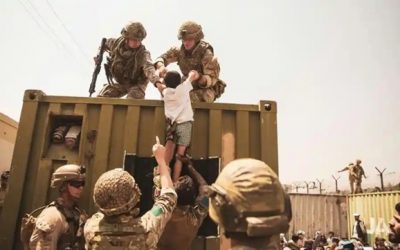To be able to say goodbye and be part of the burial process is important in coming to terms with the death of a loved one – but it is not always possible. This is the challenge for many migrants and refugees who can never return home to mourn their loved ones.
There is a phone call dreaded by every migrant – the one that tells you to come home urgently, or even worse, “I am sorry but …”.
When we leave our home country and say goodbye to our parents, our siblings, our family and our friends, there is that final hug where we squeeze even tighter, knowing it could be that “last” hug.
During the last eighteen months of COVID-19 restrictions, countless people worldwide have experienced that dreaded call – unable to get to their loved ones for those final moments, even if in the same country. Migrants and nationals alike have mourned at home, lighting candles in front of treasured photographs, crying with family over ZOOM calls, watching funeral services by video. There are no words to describe the sense of loss – not just of your loved one but of the ability to mourn them according to your culture and tradition.
As a migrant, both my parents died when I was overseas. However, I was lucky to get home in time to spend precious moments with both of them. But even now, I still recall the sick feeling in the pit of my stomach when my brother called to say it was time to come home, the rush to get long-haul flights booked and the mental push to the pilots to fly even faster. I also recall the kindness of many fellow migrants who recognised the sadness on my face. The air stewards asking passengers to stay in their seats so I could disembark first. The sympathy on the taxi driver’s face as he drove me to the hospital. When you come from a country with a sad but long history of migration, there is an empathy that supports you in your hour of need.
Fast forward to 2021, and I am still living as a migrant but geographically closer to home than I have been for almost twenty years, and still, the pain of that phone call hits hard. Like so many others, COVID claimed the lives of two beloved family members, but this time their family could not come home, we could not support our loved ones, we could not sit together and offer prayers, we could not share memories and laugh and cry together. All we could do was watch the few permitted heartbroken members of our family celebrate wonderful lives in an empty church through the power of a live video recording.
As COVID restrictions recede and a normal way of life returns, we hope that we never again have to live through such a time of sadness and loss. But for migrants, this is our norm and will always be our norm. For many migrants in the UK, whether for economic or safety reasons, they will never be able to return home. They will never hold the hand of their loved ones again, never weep on the shoulders of family and never follow their own important traditional funeral practices that are deeply ingrained in their culture, reflecting their beliefs and values.
However, there is always hope. Whatever our different beliefs and cultures, there is now a new sense of empathy to all those grieving and a shared community of support.
TGIUK respect the memories of all who have died and honour the resilience of their bereaved families wherever they are.
| There is no right or wrong way to grieve after the loss of a loved one. It helps, however, to be able to talk about your loss as keeping things inside can only prolong the pain. Talking to family, friends or a counsellor can help you come to terms with your loss. There are many organisations in the UK that provide a listening ear and can give advice on how to deal with your loss. Samaritans 116 123 Cruse Bereavement Care 0808 808 1677 Derman: (Bilingual and culturally sensitive counselling for Kurdish and Turkish communities) 020 7613 5944 Amaliah: (For a list of counselling services specific to the Muslim community) Refugee Council: (Offering mental health support of refugees and asylum seekers in the UK.) Mind: (Information on bereavement, where to go for support, and suggestions for helping yourself and others through grief.) |







